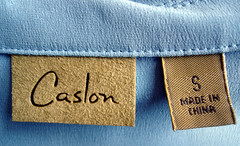
I suggest some of the following preparatory steps and resources for teachers planning to use the documentary for an argument writing assignment:
Suggested guiding questions:
- What is globalization, and how does it impact product manufacture and sales?
- Who produces goods for the U.S. market and where?
- Why do more and more U.S. companies manufacture and source products overseas, and why do U.S. consumers purchase these products?
- Why do overseas factories welcome U.S. customers and investors?
- What are the working conditions at foreign factories producing goods for the U.S. market?
- Why do factory workers in foreign factories work under the current conditions?
- What role, if any, does gender play in the U.S.-overseas production chain?
- How are artifacts/products embedded with social and cultural meaning? How and why does a product become disposable?
- What are the economic and social impacts of globalization?
Suggested teacher resources:
- Two websites by companies that connect Americans interested in manufacturing and sourcing products in China with resources in China: Built in China and Made-in-China.com
- Fishman, Ted. C. China Inc.: How the Rise of the Next Superpower Challenges America and the World. New York: Scribner, 2005.
- “Made in China: Wal-Mart Unions" on the YaleOnline website
- “200 Years of U.S. Trade with China” on the Asia for Educators website hosted by Columbia University
Suggested Opening Activities:
"Made in China" Label Search
Ask students to check their clothes, shoes, and other personal items to look for “Made in China” and other product labels, and ask them to record the names of all countries printed on the labels. Use pins or masking tape to record the countries, along with the number of items, on a large world map (which has been placed on the wall or taped onto the whit board). Without further commentary, ask students to proceed to the next step.
Reflective Writing
Give the following instructions to the students: What does our map, with our notes, tell us about global trade? What do you already know about today’s global trade and its impact on people in the U.S. and other countries? What are your personal assumptions about “Made in China”?
Discussion
Have students share their thoughts with the entire class. Write their main points on the board in two columns: global trade and “Made in China.” Ask the students to summarize what they already know about global trade and what their assumptions are about “Made in China” products in particular.
My complete lesson plan, which is available upon request, suggests two follow-up assignments:
1. An oral presentation, by groups of 4-5 students, summarizing and analyzing the motives and conditions of one category of people shown in the documentary and proposing one argumentative thesis statement about their topic. The students will get to choose from the following: The party crowd in New Orleans, the New Orleans businessman, the Chinese factory owner, the young female factory workers in China, and the families of the factory workers in China
2. An argument essay, expressing and supporting an opinion on some specific aspect about the human impact of globalization, as shown within the context of the documentary Made in China: Mardi Gras.
By the way, the documentary has also been used as a resource by many other disciplines, including sociology, history, and anthropology.

3 comments:
Rebecca at the Humanities Center gave me the link to your blog. I very much enjoyed reading both your posts about the seminar and the study guide and resources for the film. It is really great to see this stuff "put to work" so quickly.
Actually, it was a comment from a participant at the seminar that finally pushed me to create a blog myself. I intend to use it to post information about research, collaborative work with students and other things that might be useful. One of my first posts was a link to your pages here!
The blog is at: http://madeinchina.edublogs.org
Best Wishes,
David
Thanks, David, for your comments and the blog link! I can already think of many people who will want to read your blog, so I will be sending them your way. Also, thanks again for an informative and interesting seminar at the Humanities Center!
Have fun blogging,
Hanna
This is very exciting. It's a lot of food for thought which will hopefully inspire good writing and perhaps even change some buying practices. I trust that you have a copy of the video on DVD? If so, will others in the department be able to use it?
Post a Comment